|
.
Comment
> The Man Next Door: Part Three
by Ryan
Soap is a world mostly dominated by women, particularly in Britain. But is Neighbours the same? Find out in part three of our look at the men of Ramsay Street, as we move into the second half of the Nineties…
|
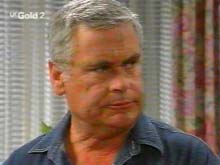
|
As the nineties reached their halfway point, major changes were afoot for Neighbours, and particularly for the men of the show. When Doug Willis departed in 1994, Lou and Philip were left as the longest-standing male cast members, at just two years service each (although both had been guest characters in the ‘golden age’ of the eighties). As for Jim and Paul Robinson years earlier, the role of women in their lives would have major implications for both characters. Having been re-introduced as a love interest for Madge, Lou found himself alone soon afterwards, and became involved in mainly comic storylines – until the arrival of Cheryl Stark. After a short stint in 1993, when she managed to announce her engagement to Lou without him actually proposing, she returned some months later to become a more permanent fixture in his life. The pairing worked well; like Madge, Cheryl was feisty, but while the memory of Harold had loomed over Madge’s romance with Lou, Cheryl came without baggage. Her arrival gave Lou a life of his own, plus the chance to be a family man again; first with Cheryl’s teenage children, and later a surprise new addition, baby Louise.
While Lou’s life was changing due to the arrival of one woman, Philip’s would be altered forever by the permanent exit of another. Although the Martin marriage was on the verge of collapse at the time, his wife Julie’s death from a fatal fall was still a huge shock to Phillip, and the impact on his character was massive. In his 1985 guest stint, Philip had been the man who cheated on his alcoholic wife with a younger woman; by 1994, he was the henpecked husband of a junior version of Mrs Mangel. Julie’s death changed Philip again – as a widowed father at the centre of the show, he began to almost morph into his late father-in-law, Jim, right down to the presence of the same kindly in-law, Helen Daniels, in support. The only difference was that viewers got to see the grieving process, which like most Neighbours grief scenes in the nineties consisted of Phil briefly hitting the bottle. In just six months he’d recovered enough to follow Jim’s example and find a younger woman, with Jen Handley following where Zoë Davis had led in 1986.
|
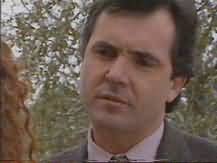
|
After Doug’s departure, a new face arrived to join Lou and Phil in the older male trio – one that would divide fans for some time to come. The Kennedy family were poorly received generally, but the head of the family, Dr Karl, was perhaps the most controversial. He’d made enemies of both Danni Stark and Cody Willis before he even arrived on Ramsay Street. Despite being a member of the caring profession, Karl was a strictly surgery hours man; his refusal to help with Marlene and Annalise’s medical concerns seemed to go against the very spirit of Neighbours. While the Kennedy family’s unorthodox family meetings suggested Karl was a diplomatic man, his decision to buy No.28 without showing it to his wife or children proved otherwise. In hindsight, introducing Karl was a very brave move on Grundy’s part – for the first time since Max Ramsay, Neighbours had a character that wasn’t deliberately nasty, yet was still difficult to like at times. Yes, there was Paul, but since his transition from trolley dolly to businessman, he was expected to cause trouble; the local doctor would traditionally have been Mr Nice. In a bold move, Grundy kept faith with both Karl and his family, and were ultimately proved right to do so, but in a different era, he could have been a one-year wonder instead of becoming one of the show’s mainstays.
While Lou, Phil and Karl became established as Ramsay Street’s elder statesmen, interesting younger men were thinner on the ground. Rick Alessi and Mark Gottlieb both departed during the infamous year of 1995, the later having become increasingly dull since his religious conversion. The popular Sam Kratz was still around, but he departed in 1996, while his friend Luke Handley suffered from terminal blandness, drifting from relationship to relationship, before finally drifting away altogether. As with Rick a few years previously, it was up to the teens to add some excitement. Bright and sensitive Brett Stark made an interesting contrast to Mal Kennedy, who was obviously being groomed as the show’s new heartthrob. However, despite being the same age, the two weren’t obvious friends, leading to the introduction of the improbably named Stonefish Rebecchi. Although initially a bad boy figure, Stonie would evolve into a comedy character as he became a regular on the show – although his unlikely liaison with Annalise would briefly put him at the forefront of the action.
|
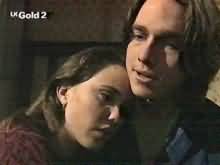
|
After a disastrous 1995, major changes were afoot in 1996, such as Stonie’s family becoming a permanent fixture in Ramsay Street. Like the Starks before them, the Rebecchis were a matriarchal family, but unlike Cheryl Stark, Angie Rebecchi did actually have a husband. However Kevin, or ‘Big Kev’ as he was known, was not made a full-time character, only popping up occasionally; and when he did, viewers discovered he wasn’t quite the big manly trucker Angie had portrayed him as, but a diminutive, henpecked figure. This was not the only evidence that men in Neighbours were being sidelined – elsewhere Jo Hartman had married, but while she remained a regular, husband Rob was little more than an extra. But by far the biggest ‘sign of the times’ was the axing of street stalwart Lou. Unaware that this was to pave the way for the return of two old favourites, fans were outraged, and Grundy were forced to rethink their decision within weeks. But with Lou staying, it was decided Cheryl had to go, which would lead to major changes for three Ramsay Street men…
Three years earlier, Cheryl’s arrival had taken Lou into a new era. Now her death led to another rebirth, as Lou was forced to adapt to life as a single parent to a toddler. Cheryl’s death also had a major impact on Karl Kennedy – thanks to him inadvertently causing it. Although Karl was absolved from blame after giving Cheryl an unintentionally lethal injection, the experience rocked him to the core, leading him to give up medicine. While his part in Cheryl’s death could have made Karl even more unpopular than he had been on arrival, it actually helped viewers to warm to him. This element of fallibility to his character made him seem more human; fans were able to empathise with his loss of confidence in his abilities. While most of Ramsay Street accepted Karl’s innocence, one man who couldn’t was Darren Stark, Cheryl’s recently returned son. A genuine ‘bad boy’ who had just left prison, Darren was an antagonist, his feud with Karl over Cheryl’s death fuelled by his relationship with Karl’s daughter Libby. Although Darren would invariably become nicer over time, he retained an edge that other characters of the time didn’t have, and he was all the more interesting for it.
|
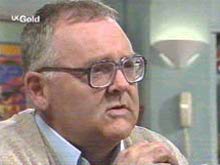
|
However, the younger men of Neighbours faded into insignificance compared to the return of an old favourite. As far as viewers knew, Harold Bishop ‘died’ in 1991, but with ratings falling – and no body ever found – a dramatic resurrection was planned. Harold, it seemed, was not dead but merely forgetful: an amnesiac to be precise. For a man washed up on a beach in Tasmania to coincidentally turn up on the street he used to live in was beyond far-fetched, but it didn’t matter; what mattered was we had Harold back. His attempts to recall his former life and to rebuild a relationship with a wife he barely remembered made for some of the most compelling Neighbours episodes in years. The lost years had softened Harold somewhat, but the essential fuddy-duddy element was still there, and made a great contrast with the show’s younger generation, and of course his old love rival Lou. After an initial three-month guest stint, Harold was back for good, and although we could never have known back then, his character would come to epitomise the show in years to come.
As a contrast to bad boy Darren, Ben Atkins became the latest character to fill the ‘nice young man’ role. Ben’s opening storyline, which revealed he was Ruth Wilkinson’s long-lost son, was promising, but he never quite lived up to its potential. Ironically, Ben only generated any excitement again when it came to his exit storyline, his horrendous car crash making a spectacular end of year finale. More successful were Drew Kirk and Joel Samuels. Kind-hearted and good-looking, Drew was loved by teenage girls and grannies alike, and his classic ‘will they, won’t they’ romance with Libby captured viewer imagination in the way that few Neighbours love stories had since Scott and Charlene. Joel, introduced as a friend of Mal Kennedy’s, successfully took over his teen heartthrob role, but would also form a popular comedy double act with Toadie Rebecchi. Toadie, along with Billy Kennedy and Lance Wilkinson, was part of the show’s first ‘classic’ teen gang in many years, and as the boys began to mature (without quite growing up), Neighbours at last had some young men genuinely worth watching.
|
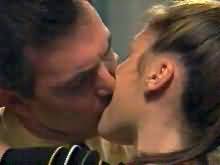
|
As the nineties rumbled on, two of the show’s forty-something men were being revitalised by the presence of new women in their lives. Ruth Wilkinson proved an ideal partner for Philip Martin, sharing much of Julie’s forthrightness, but with the tact and good sense she never had – meaning that Philip didn’t spend half his life apologising to the rest of the street. More exciting however, was Karl Kennedy’s new love interest. The once stuffy and often judgemental doctor found the boot was on the other foot when his attractive young receptionist Sarah developed feelings for him, and he found himself unable to resist her advances. While Karl’s involvement in Cheryl’s death had helped establish him in the show, his affair with Sarah, carefully written for ambiguity to its extent, was the storyline that really made his character.
With a new century approaching, the male half of the Neighbours cast was once again in strong shape. But not for the first time, a period of massive upheaval was ahead. The shock departure of one of the longest standing male characters would change the show for years to come – whilst his replacement would prove even more controversial… Join us soon for the final part of The Man Next Door as we look at the Neighbours men of the new millennium.
Back
|

